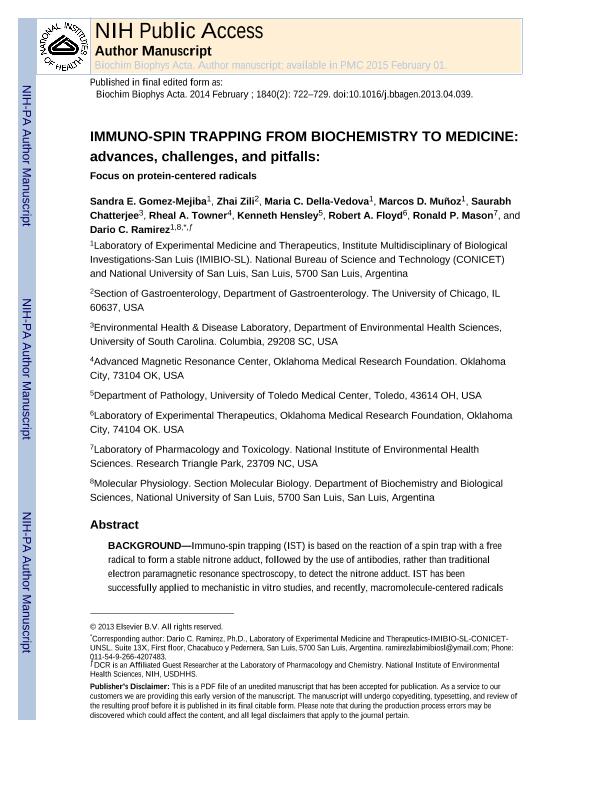Artículo
Inmuno-spin trapping from biochemistry to medicine: advances, challenges, and pitfalls. Focus on protein-centered radicals
Gomez-Mejiba, Sandra Esther ; Zhai, Zili; Della Vedova, Maria Cecilia
; Zhai, Zili; Della Vedova, Maria Cecilia ; Muñoz, Marcos David
; Muñoz, Marcos David ; Chatterjee, Saurabh; Towner, Rheal A.; Hensley, Kenneth; Floyd, Robert A.; Mason, Ronald P.; Ramirez, Dario
; Chatterjee, Saurabh; Towner, Rheal A.; Hensley, Kenneth; Floyd, Robert A.; Mason, Ronald P.; Ramirez, Dario
 ; Zhai, Zili; Della Vedova, Maria Cecilia
; Zhai, Zili; Della Vedova, Maria Cecilia ; Muñoz, Marcos David
; Muñoz, Marcos David ; Chatterjee, Saurabh; Towner, Rheal A.; Hensley, Kenneth; Floyd, Robert A.; Mason, Ronald P.; Ramirez, Dario
; Chatterjee, Saurabh; Towner, Rheal A.; Hensley, Kenneth; Floyd, Robert A.; Mason, Ronald P.; Ramirez, Dario
Fecha de publicación:
02/2014
Editorial:
Elsevier Science
Revista:
Biochimica et Biophysica Acta- General Subjects
ISSN:
0304-4165
Idioma:
Inglés
Tipo de recurso:
Artículo publicado
Clasificación temática:
Resumen
Background: Immuno-spin trapping (IST) is based on the reaction of a spin trap with a free radical to form a stable nitrone adduct, followed by the use of antibodies, rather than traditional electron paramagnetic resonance spectroscopy, to detect the nitrone adduct. IST has been successfully applied to mechanistic in vitro studies, and recently, macromolecule-centered radicals have been detected in models of drug-induced agranulocytosis, hepatotoxicity, cardiotoxicity, and ischemia/reperfusion, as well as in models of neurological, metabolic and immunological diseases. Scope of the review: To critically evaluate advances, challenges, and pitfalls as well as the scientific opportunities of IST as applied to the study of protein-centered free radicals generated in stressed organelles, cells, tissues and animal models of disease and exposure. Major conclusions: Because the spin trap has to be present at high enough concentrations in the microenvironment where the radical is formed, the possible effects of the spin trap on gene expression, metabolism and cell physiology have to be considered in the use of IST and in the interpretation of results. These factors have not yet been thoroughly dealt with in the literature. General significance: The identification of radicalized proteins during cell/tissue response to stressors will help define their role in the complex cellular response to stressors and pathogenesis; however, the fidelity of spin trapping/immuno-detection and the effects of the spin trap on the biological system should be considered.
Archivos asociados
Licencia
Identificadores
Colecciones
Articulos(IMIBIO-SL)
Articulos de INST. MULTIDICIPLINARIO DE INV. BIO. DE SAN LUIS
Articulos de INST. MULTIDICIPLINARIO DE INV. BIO. DE SAN LUIS
Citación
Gomez-Mejiba, Sandra Esther; Zhai, Zili; Della Vedova, Maria Cecilia; Muñoz, Marcos David; Chatterjee, Saurabh; et al.; Inmuno-spin trapping from biochemistry to medicine: advances, challenges, and pitfalls. Focus on protein-centered radicals; Elsevier Science; Biochimica et Biophysica Acta- General Subjects; 1840; 2; 2-2014; 722-729
Compartir
Altmétricas



